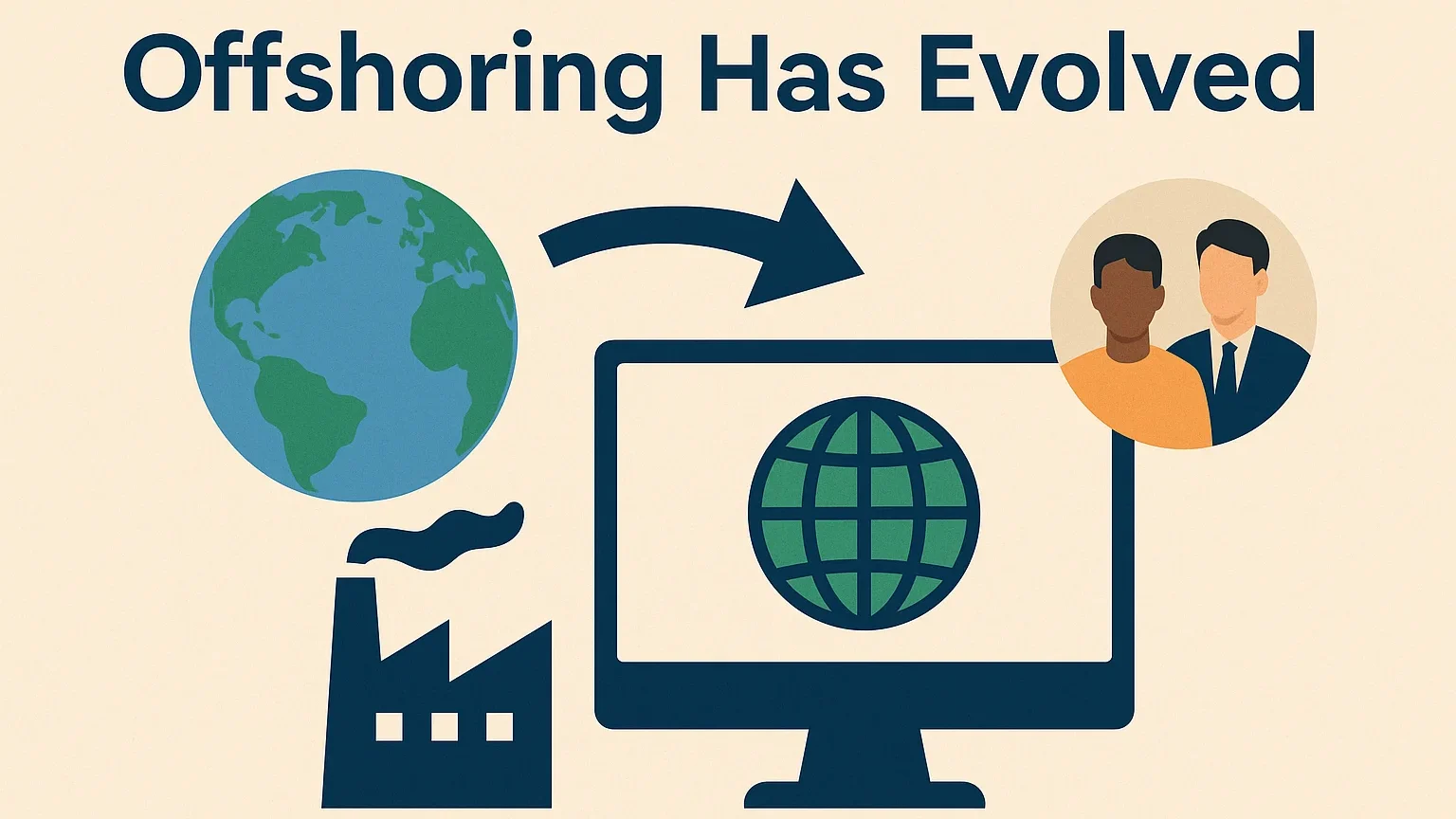In the fast-paced world of technology, success is no longer confined to Silicon Valley or any single geographic location. The digital economy has transformed the way businesses think about teams, productivity, and talent acquisition. One of the most compelling shifts in recent years has been the move toward globally distributed teams not just to cut costs, but to unlock better outcomes. According to a McKinsey survey, 56% of employees now work in hybrid arrangements, spending one to four days in the office, reflecting a broader shift toward flexibility and global collaboration. Location is no longer a limiting factor in building world-class teams. Tech companies, both big and small, are realizing that building efficient teams often means thinking outside traditional borders.
Table of contents
Rethinking the Idea of “Local Talent”

Once upon a time, hiring locally was considered the gold standard. You’d look for someone who could come into the office, shake hands, and be part of the daily hustle. However, as collaboration tools improved and global internet infrastructure evolved, the idea of limiting oneself to a specific talent pool began to seem outdated, if not outright counterproductive.
Hiring locally can often mean competing with dozens of other companies for the same few qualified candidates. Salaries surge, expectations rise, and it becomes increasingly complex to retain talent in overheated markets. Meanwhile, beyond the borders of these traditional tech hubs, numerous highly skilled professionals are ready to make a significant impact.
The Value of Global Talent Isn’t Just Economic
| Category | Key Benefits | Examples |
|---|---|---|
| Cultural Diversity | Introduces new perspectives, promotes inclusivity, and enhances creativity | Multilingual customer support, culturally relevant product design |
| Innovation | Encourages problem-solving through varied experiences and thinking styles | Teams from different regions solving UX challenges in unique ways |
| Market Expansion | Provides insights into new regions and audiences | Hiring local marketers to break into APAC or LATAM markets |
| Talent Availability | Access to specialized skills not readily available locally | Data scientists in India, AI engineers in Eastern Europe |
| Resilience & Flexibility | Time zone diversity enables 24/7 operations and greater adaptability | Global dev teams maintain continuous deployment cycles |
| Brand Reputation | Enhances the company’s image as inclusive and globally minded | Being seen as a fair, borderless employer improves stakeholder perception |
| Cost Efficiency | May reduce overhead without compromising quality | Remote engineers working from lower-cost regions |
| Employee Learning | Promotes cross-cultural learning and professional growth | Internal knowledge-sharing programs between global teams |
While cost savings are notable, Eastern European developers can cost 40–60% less than their U.S. counterparts; the value goes far beyond economics. A developer based in Eastern Europe, Southeast Asia, or Latin America often comes with a significantly lower price tag than someone in New York or London. However, this is only part of the story. What’s frequently overlooked is how global teams can increase innovation, resilience, and speed.
When companies tap into diverse geographic regions, they also tap into different ways of thinking and perspectives. Cultural variation can be a strength, as different educational backgrounds and problem-solving approaches often yield better solutions when properly managed. Time zone coverage can mean true 24/7 development cycles. And having people across various regions can make a company more agile when entering new markets.
Offshoring Has Evolved

The word “offshoring” might still carry baggage from earlier decades, when it was primarily associated with repetitive, low-skill labor. But today, it’s a different landscape. Now it often refers to elite software developers, product designers, and digital marketers, people who are not only highly qualified but also fluent in agile methodologies, experienced with international teams, and proactive in communication.
Eastern Europe, which accounts for nearly 8% of the global software developer workforce, has become a go-to region for startups and scaleups seeking to build elite offshore teams. Countries like Serbia, Ukraine, Poland, and Romania have gained recognition for producing top-tier tech talent, many of whom have been involved in global projects from the outset.
That’s one reason why many startups and scaleups are turning to Eastern Europe offshoring to build highly productive, cost-effective teams. It’s not just about saving money; it’s about tapping into a rich, underutilized talent pool that brings both technical excellence and a strong work ethic to the table.
Building Efficiency Isn’t About Micro-Management
There’s a common fear that working with remote teams, especially those based globally, will make it harder to control quality or maintain standards. However, that fear often stems from outdated management mindsets. Efficiency today is more about autonomy, trust, and outcomes than visibility.
Great tech leaders understand that efficiency means providing teams with clarity of purpose and the space to execute. When working with global teams, setting expectations, aligning on workflows, and using the right tools are what make the difference. It’s not about where someone is sitting; it’s about what they’re delivering, how well they collaborate, and how fast they learn.
Communication Is the Foundation

Even the most talented team will fail without strong communication practices. That’s why successful tech companies that hire globally tend to invest heavily in asynchronous tools, a culture of documentation, and clear feedback loops. They don’t just “let” people work from anywhere; they build systems that make that possible.
Project management tools like Jira, Trello, or Linear; messaging platforms like Slack or Microsoft Teams; and real-time collaboration tools like Notion, Google Docs, or Figma, have become the new “office.” However, they only work if everyone is on the same page regarding their use. That’s why companies serious about global hiring also tend to have strong onboarding processes and well-documented playbooks.
It’s Also About Long-Term Thinking
One of the biggest mistakes companies make with offshore teams is treating them as temporary. Real efficiency emerges when offshore team management isn’t an afterthought, but rather part of the company’s DNA. That means hiring people with growth potential, investing in their development, and creating a sense of belonging even if they’re thousands of miles away. Companies that invest in onboarding and inclusion for remote hires see the payoff: retention improves by 25%, and engagement rises across the board.
When global employees feel like core team members rather than outside help, retention improves, motivation increases, and the entire team benefits from a richer, more committed culture.
From Surviving to Scaling
For startups, especially, global talent can be a game-changer. When you’re burning runway and racing to ship features, being able to hire fast, affordably, and without compromising quality can be the difference between survival and scale. Diverse teams aren’t just beneficial for culture; they’re also helpful for business.
According to McKinsey & Company, “Diversity Wins,” 2020 teams with high diversity are 35% more likely to outperform their peers financially. You gain resilience, and your operations are not dependent on a single office. You get flexibility, more options for hiring, for pivoting, for growing. And you gain credibility; clients and investors increasingly want to see that companies can build and manage global teams effectively.
The Future Is Already Distributed
The most efficient teams of tomorrow won’t all sit under one roof. They’ll be spread across time zones, continents, and cultures united not by geography, but by purpose and performance.
Tech companies that learn how to tap into global talent early and do it well are already ahead of the curve. They’re not just reacting to change; they’re shaping it.
So whether you’re a bootstrapped founder or a scaling CTO, don’t just ask where the best people are. Ask how to bring them into your mission, wherever they are in the world. The answer might be just a few clicks and a few thousand miles away.











